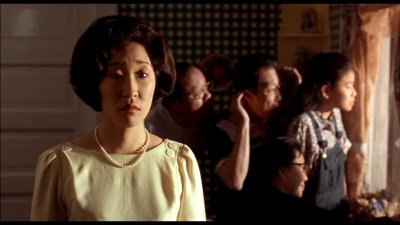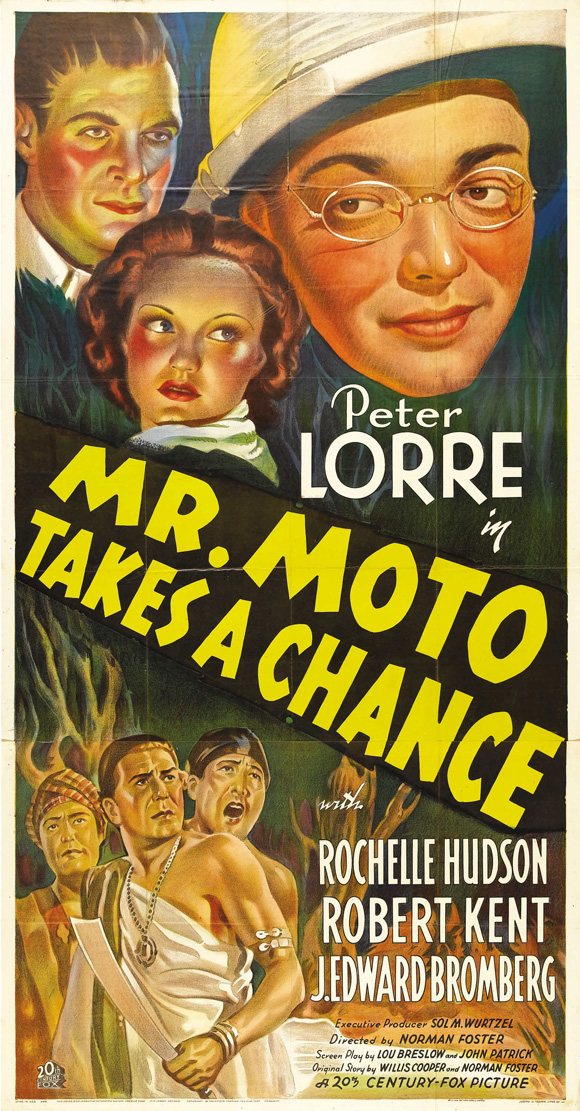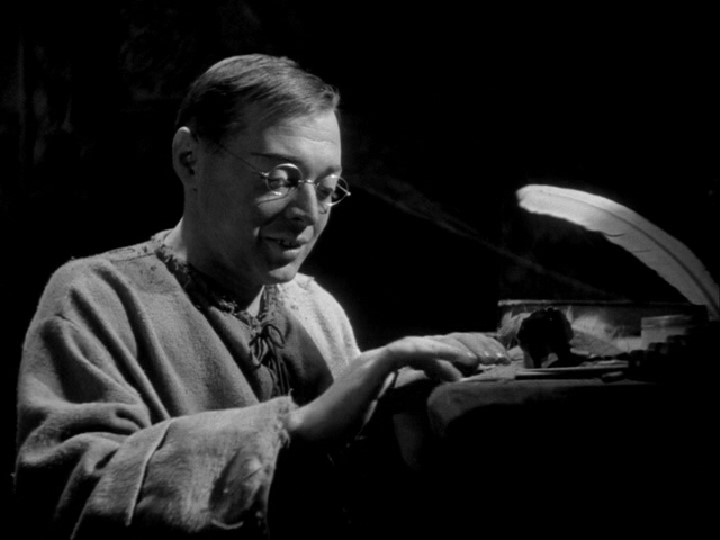Once upon a time, a movie called Joy Luck Club came out. (Most) everyone loved it. Soon afterwards, many other JLC rip-offs debuted and just didn't measure up. This is one of those rip-offs. Except that this one is Canadian.
"Forget that they're a Chinese family, just think of them as any old family. You know, any old white family... I grew up wondering why we couldn't be the Brady Bunch... But then again, Brady Bunch never needed subtitles."
Jade Li (Sandra Oh) is a twenty-two year old aspiring actress who lives with her extremely traditional Chinese family somewhere in Canada. Her parents only want four things in life - to get money from the penny stocks, to put on the "best" public persona to save face, to marry Jade off to a nice Chinese boy, and have prosperity. Jade couldn't care less about getting married or prosperity, causing her parents to be very worried about her. All she wants is to be an actress. She's also attracted to a nice Caucasian grad student named Mark (Callum Keith Rennie), even though she knows her parents would be very upset with her. However, her parents (and extended family) keep on trying to set Jade up with a nice Chinese boy. They introduce her to Andrew (Johnny Mah), and they go on a date together. However, Andrew tells Jade that he's gay, and they decide that they can only be friends. The plot rambles from there, taking Jade to auditions to awkward dates with Mark to awkward-er dates with faceless nice Chinese boys. Finally, Jade gets fed up and moves out of her family home, causing her to be disowned by her strict, one-dimensional Chinese father. Fin.
Double Happiness is one of those movies with funny bits and pieces but the overall story just rambles and doesn't seem to have a point. It's release seemed to be riding on the coattails of Joy Luck Club too much. It was another one of those bankable "family-culture-clash-Asians-are-people-too" movies that really didn't measure up to the still sub-par JLC. Also, the idea of "double happiness" never even gets mentioned in the movie - or if it does, it's mentioned in passing and I missed it. Either way, that's uncool.
The similarities between Joy Luck Club and Double Happiness are eerie. Both feature Asian families with immigrant parents and Americanized children. Both have "studly" white guys as love interests. Both have strong, independent Asian American women trying to break free from the overbearing Chinese-ness of their families as the main characters/plot devices. Both have these weird, now-you-see-them-now-you-don't messages - almost like an "It's okay to be Asian American!" sort of thing. Both have themes about staying true to your family and being true to yourself as well (take this opportunity to wipe away the tears), while assimilating into Western culture while remaining faithful to your "true" heritage and culture.
However, they both have their own "defining" characteristics. Double Happiness is meant to be a lighthearted comedy - God forbid you even crack a smile during most of the scenes in Joy Luck Club. Double Happiness has no plot - Joy Luck Club has several of them. But it really ends there. Unfortunately, there aren't all that many things in Double Happiness to compare to anything.
This, however, is one of the funnier moments in the movie. This is a scene where Jade is auditioning for an itty bitty role in some random movie. She has a total of 3 lines in the scene that she is reading, where she is a waitress. After she finishes the reading, the director asks her to do it in an accent. Jade responds with a pretty spot-on French accent... but that's not what the director wants. Then Jade is forced to belittle herself by saying, "A very good Chinese accent I can do for you." Cringe. Poor girl.
I found this scene hilarious because (I've been told) it's true. Asian actors are usually reduced to auditioning for bit parts in big movies, and at the auditions, they're usually asked if they can do some sort of generic Asian accent. If they can't, they probably won't get the part or won't be considered for other parts. If they can, they will probably land the part of some Perpetual Foreigner with some awful accent. If they're "lucky" (and luck is relative) they'll get famous for their accent and rocket to a fame based solely on a stereotypical portrayal (see Ken Jeong of the Slim Chin and The Hangover). Yuck. That isn't "lucky" in my book. In my opinion, Ken Jeong is my generation's Gedde Watanabe - the similarities are uncanny.
 But I digress. Jade's audition scene is probably a common occurrence for aspiring Asian-American actors. Directors seem to buy into this Perpetual Foreigner stereotype a little too much - it's almost like the assumption is "If you're Asian, you can do the accent." Very different from Ye Olde Days of Charlie Chan and Fu Manchu, when putting on an accent was the very least of the actors and directors' concern. Now, it's the opposite - and you can't be white and do the accent. You have to be Asian and do the accent. Perpetuating stereotypes - yay! Jade seems to realize this after her "Parisian accent" gets a look of confusion from the director and the other chick. And, lo and behold, she later "stars" in a scene where her face doesn't even get shown. She's cast as the headless, semi-mute, foreign Asian waitress, and it's depressing. That's why I found this scene so compelling - it shows the dilemmas that Asian Americans face in the audition rooms, and, subsequently, in the movie industry.
But I digress. Jade's audition scene is probably a common occurrence for aspiring Asian-American actors. Directors seem to buy into this Perpetual Foreigner stereotype a little too much - it's almost like the assumption is "If you're Asian, you can do the accent." Very different from Ye Olde Days of Charlie Chan and Fu Manchu, when putting on an accent was the very least of the actors and directors' concern. Now, it's the opposite - and you can't be white and do the accent. You have to be Asian and do the accent. Perpetuating stereotypes - yay! Jade seems to realize this after her "Parisian accent" gets a look of confusion from the director and the other chick. And, lo and behold, she later "stars" in a scene where her face doesn't even get shown. She's cast as the headless, semi-mute, foreign Asian waitress, and it's depressing. That's why I found this scene so compelling - it shows the dilemmas that Asian Americans face in the audition rooms, and, subsequently, in the movie industry.
Now look at this scene. Sandra Oh starts off pretending to be the mute Geisha-girl while Callum Rennie hits on her awkwardly. I don't actually care about Callum Rennie and his being awkward - it's the mute Geisha-girl thing. I have no idea what the purpose of this was. Is she trying to get his attention? It seems like a bad idea - I mean, if you're mute, you're not going to be grabbing anyone's attentions, right? Or is Jade/Oh trying to get him to leave her alone - the whole "I no speak Engrish" thing? I can't tell. Either way, it must work, because they end up sleeping together. My question, however, is why. Why does she adopt this weird foreign girl persona, when she is clearly (judging on looks alone) very very very Canadian/Westernized? What's the purpose? This may have been the most random part of the whole movie - and I still don't get it.
The one other good thing I can say about this film is that it was written and directed by an Asian woman, Mina Shum. Props to Shum for being a woman in an industry which has always been male-dominated, and props for being an Asian-Canadian at the same time. We need more of her type. More of her type and fewer JLC rip-offs.
Jade Li (Sandra Oh) is a twenty-two year old aspiring actress who lives with her extremely traditional Chinese family somewhere in Canada. Her parents only want four things in life - to get money from the penny stocks, to put on the "best" public persona to save face, to marry Jade off to a nice Chinese boy, and have prosperity. Jade couldn't care less about getting married or prosperity, causing her parents to be very worried about her. All she wants is to be an actress. She's also attracted to a nice Caucasian grad student named Mark (Callum Keith Rennie), even though she knows her parents would be very upset with her. However, her parents (and extended family) keep on trying to set Jade up with a nice Chinese boy. They introduce her to Andrew (Johnny Mah), and they go on a date together. However, Andrew tells Jade that he's gay, and they decide that they can only be friends. The plot rambles from there, taking Jade to auditions to awkward dates with Mark to awkward-er dates with faceless nice Chinese boys. Finally, Jade gets fed up and moves out of her family home, causing her to be disowned by her strict, one-dimensional Chinese father. Fin.
Double Happiness is one of those movies with funny bits and pieces but the overall story just rambles and doesn't seem to have a point. It's release seemed to be riding on the coattails of Joy Luck Club too much. It was another one of those bankable "family-culture-clash-Asians-are-people-too" movies that really didn't measure up to the still sub-par JLC. Also, the idea of "double happiness" never even gets mentioned in the movie - or if it does, it's mentioned in passing and I missed it. Either way, that's uncool.
The similarities between Joy Luck Club and Double Happiness are eerie. Both feature Asian families with immigrant parents and Americanized children. Both have "studly" white guys as love interests. Both have strong, independent Asian American women trying to break free from the overbearing Chinese-ness of their families as the main characters/plot devices. Both have these weird, now-you-see-them-now-you-don't messages - almost like an "It's okay to be Asian American!" sort of thing. Both have themes about staying true to your family and being true to yourself as well (take this opportunity to wipe away the tears), while assimilating into Western culture while remaining faithful to your "true" heritage and culture.
However, they both have their own "defining" characteristics. Double Happiness is meant to be a lighthearted comedy - God forbid you even crack a smile during most of the scenes in Joy Luck Club. Double Happiness has no plot - Joy Luck Club has several of them. But it really ends there. Unfortunately, there aren't all that many things in Double Happiness to compare to anything.
This, however, is one of the funnier moments in the movie. This is a scene where Jade is auditioning for an itty bitty role in some random movie. She has a total of 3 lines in the scene that she is reading, where she is a waitress. After she finishes the reading, the director asks her to do it in an accent. Jade responds with a pretty spot-on French accent... but that's not what the director wants. Then Jade is forced to belittle herself by saying, "A very good Chinese accent I can do for you." Cringe. Poor girl.
I found this scene hilarious because (I've been told) it's true. Asian actors are usually reduced to auditioning for bit parts in big movies, and at the auditions, they're usually asked if they can do some sort of generic Asian accent. If they can't, they probably won't get the part or won't be considered for other parts. If they can, they will probably land the part of some Perpetual Foreigner with some awful accent. If they're "lucky" (and luck is relative) they'll get famous for their accent and rocket to a fame based solely on a stereotypical portrayal (see Ken Jeong of the Slim Chin and The Hangover). Yuck. That isn't "lucky" in my book. In my opinion, Ken Jeong is my generation's Gedde Watanabe - the similarities are uncanny.
 But I digress. Jade's audition scene is probably a common occurrence for aspiring Asian-American actors. Directors seem to buy into this Perpetual Foreigner stereotype a little too much - it's almost like the assumption is "If you're Asian, you can do the accent." Very different from Ye Olde Days of Charlie Chan and Fu Manchu, when putting on an accent was the very least of the actors and directors' concern. Now, it's the opposite - and you can't be white and do the accent. You have to be Asian and do the accent. Perpetuating stereotypes - yay! Jade seems to realize this after her "Parisian accent" gets a look of confusion from the director and the other chick. And, lo and behold, she later "stars" in a scene where her face doesn't even get shown. She's cast as the headless, semi-mute, foreign Asian waitress, and it's depressing. That's why I found this scene so compelling - it shows the dilemmas that Asian Americans face in the audition rooms, and, subsequently, in the movie industry.
But I digress. Jade's audition scene is probably a common occurrence for aspiring Asian-American actors. Directors seem to buy into this Perpetual Foreigner stereotype a little too much - it's almost like the assumption is "If you're Asian, you can do the accent." Very different from Ye Olde Days of Charlie Chan and Fu Manchu, when putting on an accent was the very least of the actors and directors' concern. Now, it's the opposite - and you can't be white and do the accent. You have to be Asian and do the accent. Perpetuating stereotypes - yay! Jade seems to realize this after her "Parisian accent" gets a look of confusion from the director and the other chick. And, lo and behold, she later "stars" in a scene where her face doesn't even get shown. She's cast as the headless, semi-mute, foreign Asian waitress, and it's depressing. That's why I found this scene so compelling - it shows the dilemmas that Asian Americans face in the audition rooms, and, subsequently, in the movie industry. Now look at this scene. Sandra Oh starts off pretending to be the mute Geisha-girl while Callum Rennie hits on her awkwardly. I don't actually care about Callum Rennie and his being awkward - it's the mute Geisha-girl thing. I have no idea what the purpose of this was. Is she trying to get his attention? It seems like a bad idea - I mean, if you're mute, you're not going to be grabbing anyone's attentions, right? Or is Jade/Oh trying to get him to leave her alone - the whole "I no speak Engrish" thing? I can't tell. Either way, it must work, because they end up sleeping together. My question, however, is why. Why does she adopt this weird foreign girl persona, when she is clearly (judging on looks alone) very very very Canadian/Westernized? What's the purpose? This may have been the most random part of the whole movie - and I still don't get it.
The one other good thing I can say about this film is that it was written and directed by an Asian woman, Mina Shum. Props to Shum for being a woman in an industry which has always been male-dominated, and props for being an Asian-Canadian at the same time. We need more of her type. More of her type and fewer JLC rip-offs.








.jpg)










